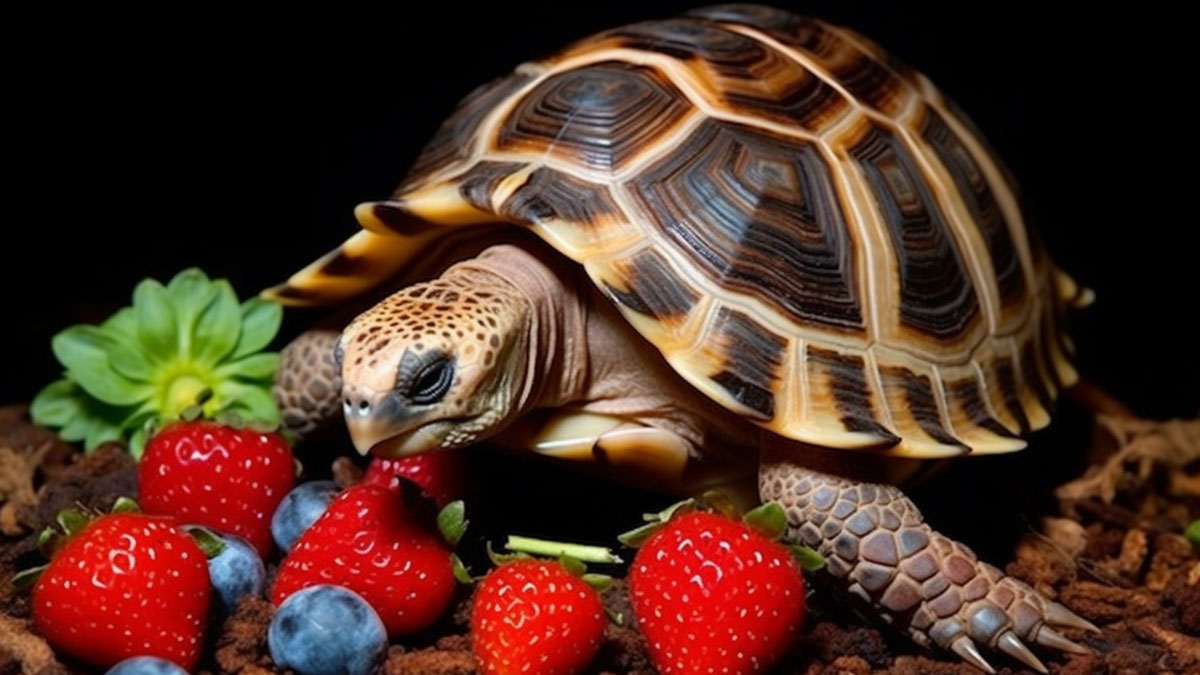How Long Can a Tortoise Go Without Food?
Tortoises are popular pets among reptile fans due to their long lifetime and well-known slow gait. As responsible pet parents, we must take care of the tortoise’s nourishment. But there could be times when a tortoise can’t get to the food, such as when it’s traveling or hibernating.
So the question is, how long can a tortoise go without food? There are several contributing factors, such as age, health, and water access for tortoise survival without food. However, a mature tortoise can generally live between 6 months to 3 years on fasting. Note that tortoise lifespan without food varies from species to specie as well.
This number is much less for baby tortoises as they can only survive a week without food. You must be interested to learn more about tortoises’ survival without food. So let’s get to our detailed blog below!
How Long Can a Tortoise Survive Without Food?
Contents
The answer to this question is not straightforward as different factors can add to or minus numbers of tortoise life if they starve. Below we are describing different factors that can influence the tortoise’s life span while starving:
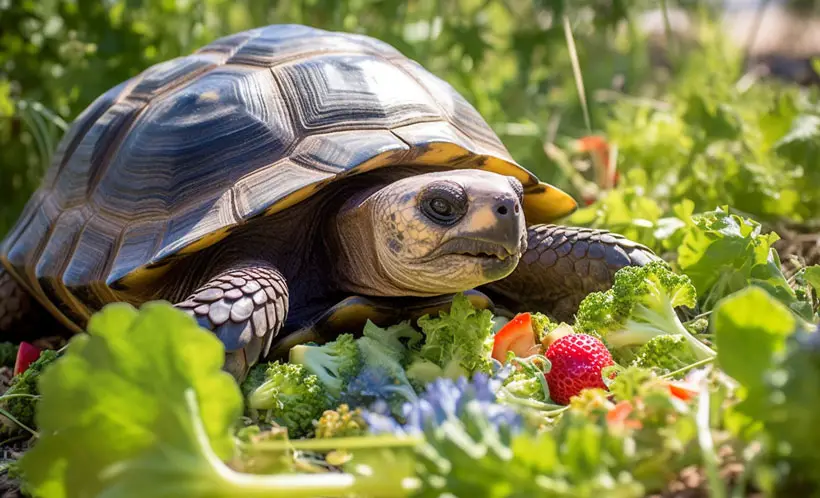
Age and Size of the Tortoise
The most crucial factor influencing the diet needs of the tortoise is its age and size. And when it comes to size, there are three categories in which can place tortoises:
1. Baby Tortoise
Baby tortoises are those that are six months or less. Since the baby tortoise or hatchlings develop more quickly than the adult ones, they need continuous food and water supply for better growth. So they cannot survive a week without food.
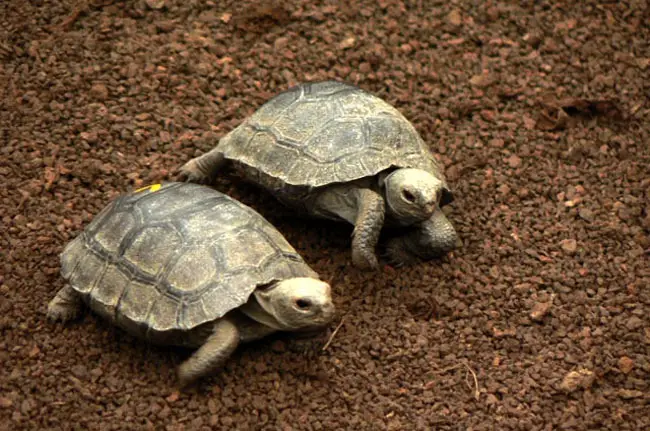
2. Juvenile Tortoise
These tortoises are neither hatchlings nor adults, and their starvation period also lies in between. Regarding that, juveniles can survive only 2-4 weeks if you don’t provide food and water.
Moreover, if you starve them for a long time, it will take a toll on their health as they can encounter problems like metabolic bone disease and pyramiding.
3. Adult Tortoise
For adult tortoises, the scenario is different. The adult tortoise has a fully developed bladder in which it can preserve water.
Moreover, their metabolism is also slow, so they have fat deposits that they can utilize when needed.
So, in a nutshell, the adult tortoise can survive anywhere from 6 months to 3 years without food. However, that number differs for every tortoise species and their conditions.
Environmental Conditions
The environmental conditions of your tortoise will also add to or reduce the numbers from fasting time. Environmental conditions include habitat temperature, humidity, and availability of water sources, which can significantly influence a tortoise’s metabolic rate and hydration levels.
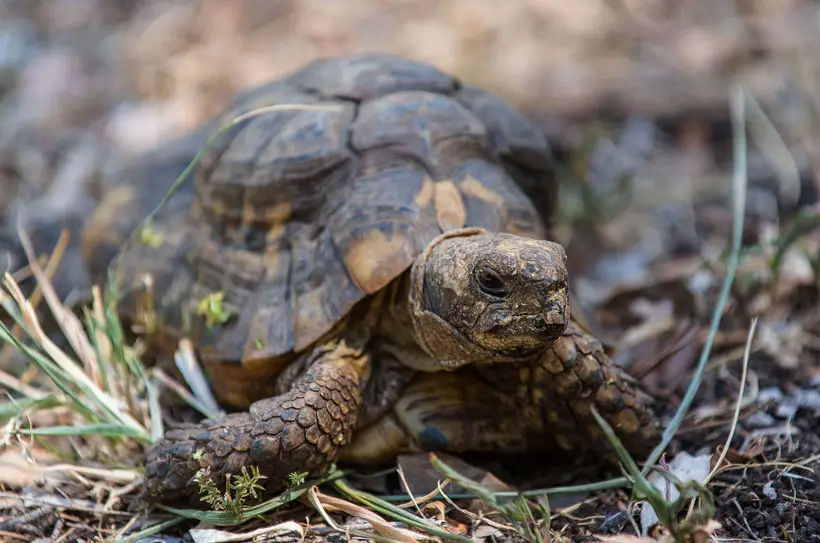
It is worth mentioning that despite being a formidable creature, extreme environmental conditions take a toll on the tortoise’s health and can shorten the fasting period. And those conditions include,
Water Access
Despite the fact that tortoises don’t ask for water for swimming, you have to provide them with a water source to devour on and bathe. So if you don’t provide them water during fasting, their body will dehydrate. Thus, their beautiful shell and skin lose all their beauty as they get dry and flaky.
But these are all short-term effects. In the long run, the tortoise can develop severe health conditions, such as kidney failure, articular gout, etc.
Habitat Temperature
Being cold-blooded creatures, tortoises’ cannot regulate body temperature alone. Tortoises don’t like winters since they become inactive and slow their metabolism. During this time, they consume very little oxygen and burn very few calories as their focus is to store the fat.
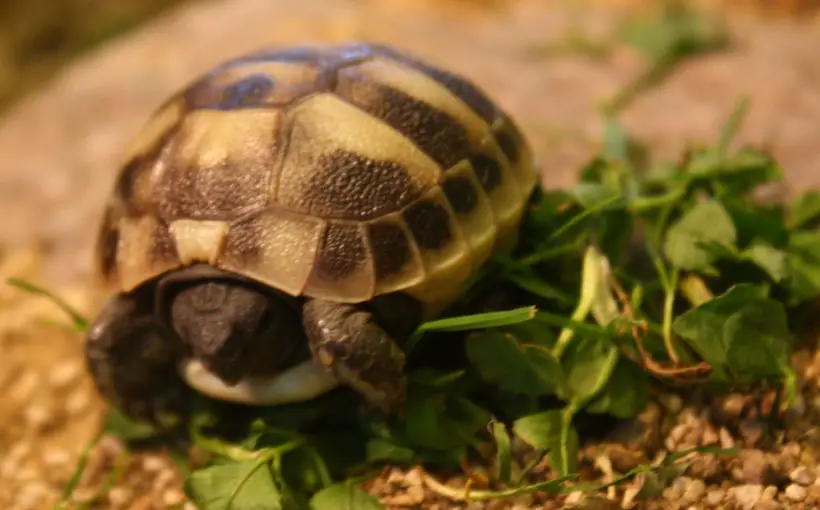
This is where hibernation comes in. Wherein they enter a sleep-like state, become inactive for months and depend on their body fat deposits. During this time, they merely wake up for water only.
Accordingly, if the habitat temperature of the tortoise gets below 45 degrees Fahrenheit, the tortoise will enter the hibernating phase. Moreover, the temperature below 60 degrees Fahrenheit will prepare the tortoise for hibernation as they start to store energy.
So if you want your tortoise to survive three to six months without food, you should simulate the habitat temperature below 45 degrees.
Health and Overall Condition
A tortoise’s capacity to tolerate fasting depends significantly on its general health and condition. A tortoise’s ability to go without food may be diminished if it is weak, unwell, healing from a medical condition, or injured.
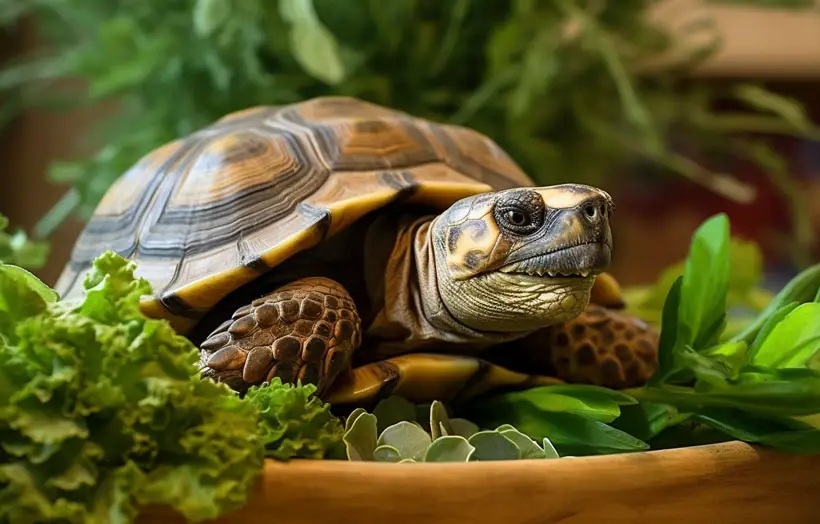
It’s crucial to keep a close eye on your tortoise’s health and seek advice from a vet if you worry about its capacity to fast comfortably.
Previous Nutritional Status
Before a fasting phase, a tortoise’s nutritional state can affect how long it can go without food. Fasting is more inclined to be tolerated by a tortoise with adequate energy reserves as opposed to one under or malnourished.
Although tortoises may go for extended periods without food, giving them a well-rounded diet to promote their excellent health remains ideal.
You should prevent long periods of fasting and ask any questions regarding a tortoise’s diet or fasting duration from a reptile veterinarian to safeguard the animal’s health.
Tortoise Species
Different species of tortoises have varying metabolic rates and energy requirements. Some species may have evolved to withstand long periods without food, while others may require more frequent feeding. Researching the specific dietary needs of your tortoise’s species is essential.
Some of the tortoise species and their capacity to survive fasting are the following:
Galapagos Tortoise (Chelonoidis nigra)
Native to the Galapagos Islands in the Pacific Ocean, they are among the largest tortoise species. While Galapagos tortoises can live well over 100 years but if you starve them, they might live up to one year.
The fact that they can reserve energy and water in their bodies, and also they have sluggish metabolic rates. They can live a long time without food and water.
Aldabra Tortoise (Aldabrachelys gigantea)
The resident of Aldabra Atoll in the Seychelles is also a gigantic tortoise. But this tortoise species also entail slow metabolism and can preserve fat and water/ So when they enter the starvation phase they can leverage it.
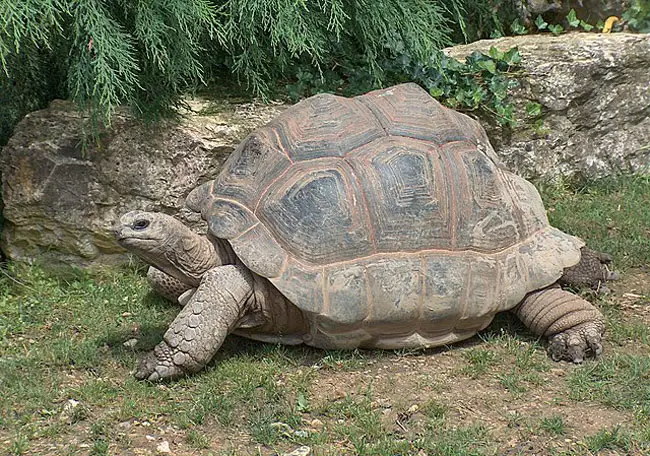
Russian tortoise (Agrionemys Horsfieldii)
The Russian tortoise, aka Horsfield’s tortoise, is a Central Asia habitant. Speaking of their size, they are smaller as they don’t exceed 10 inches in length, and that’s the reason they are most familiar to pets.
These Horsfield tortoises are fascinating creatures. They can survive without food and water for as long as three years. But how do they do it? With the hibernation process, they can achieve this whooping figure.
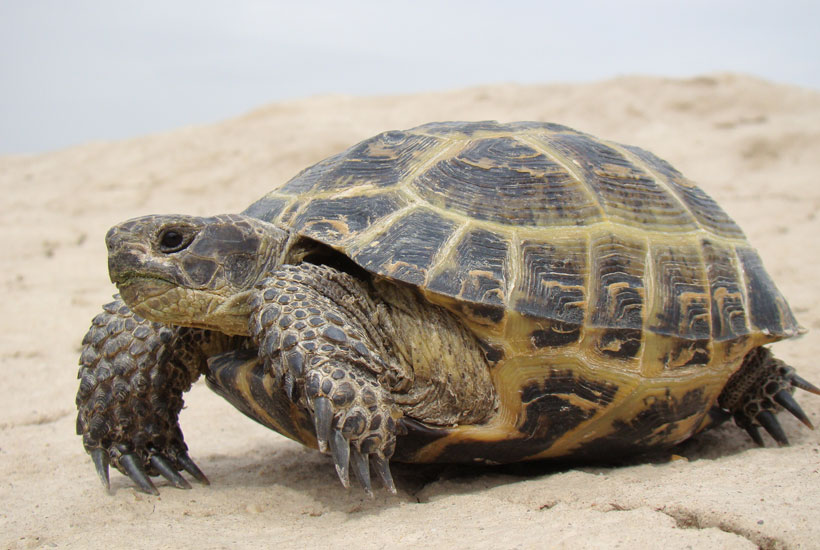
Hermann tortoise (Testudo hermanni)
Hermann’s tortoise is a habitat of regions like Spain, Italy, and Greece. Being small-sized tortoise species and their Mediterranean habitat, their survival time without food differs.
Speaking of that, they can survive a few weeks to 3 months without food and water. Since these tortoises can withhold liquid in their body, they can survive a long time without food and water.
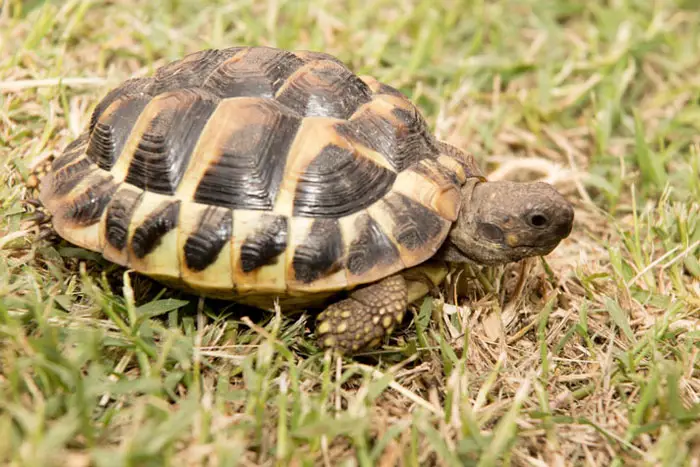
Red-footed Tortoise (Chelonoidis carbonarius and Chelonoidis denticulatus)
Red-footed tortoises are medium-sized tortoises that are more prevalent in the pet trade owing to their convenient size and striking look. If you ask about their fasting duration, they can survive up to half a year without food; however, they will need water during that time.
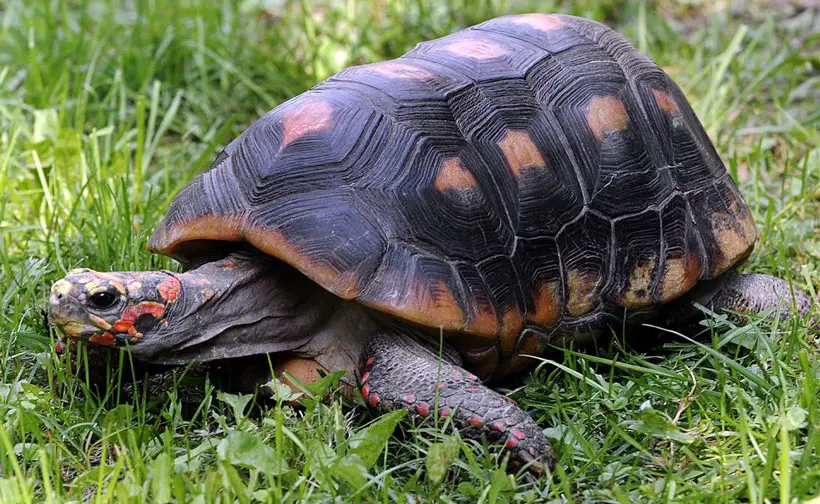
Sulcata tortoise/African Spurred Tortoise (Centrochelys Sulcata)
Native to the sub-Saharan region of Africa. These African spurred tortoises are distinguished for their large size and distinctive spurs on their hind legs. They are popular as pets and can survive for as many as three months without food and water.
However, this number can go up or down depending on the size of your tortoise. Nevertheless, providing them with food once in 3 days is good.
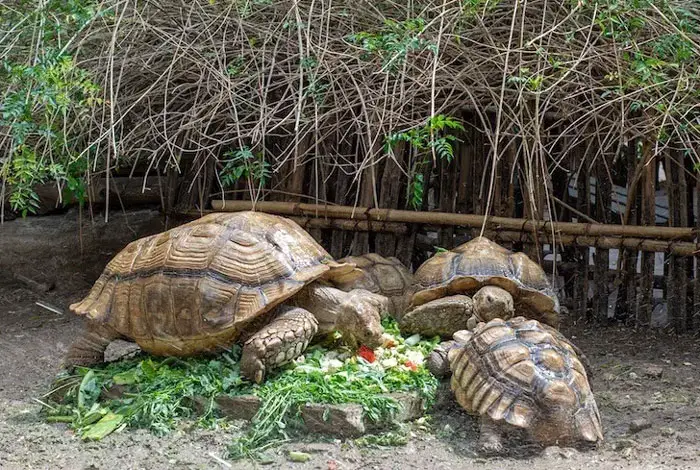
Desert tortoise (Gopherus agassizii)
Desert tortoises dwell in the southwestern United States and parts of Mexico. Since they live in harsh desert weather, they can live up to three years without food and water.
How? This tortoise burrows to conserve moisture, and also they have drought resistance. They can minimize their activities and hibernate to save energy with limited resources. Moreover, these tortoises also hibernate when they get exogenous cues like low temperature etc.
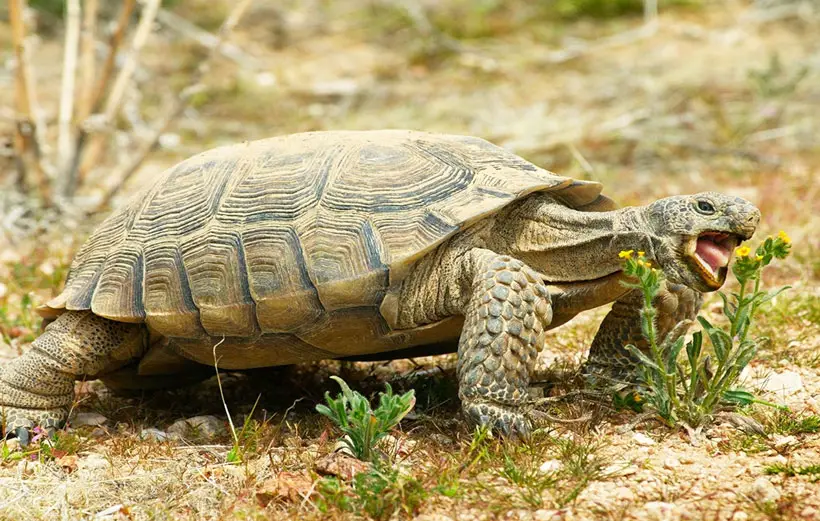
Gopher tortoise (Gopherus polyphemus)
Gopher tortoises are large tortoise species that mostly live in the southeastern United States. Speaking of their fasting duration, they can survive a long time, up to three years without food and almost a year without water.
Since they also dig deep burrows up to 40 feet (12 meters) long and 10 feet (3 meters) deep, they can preserve moisture during harsh weather.
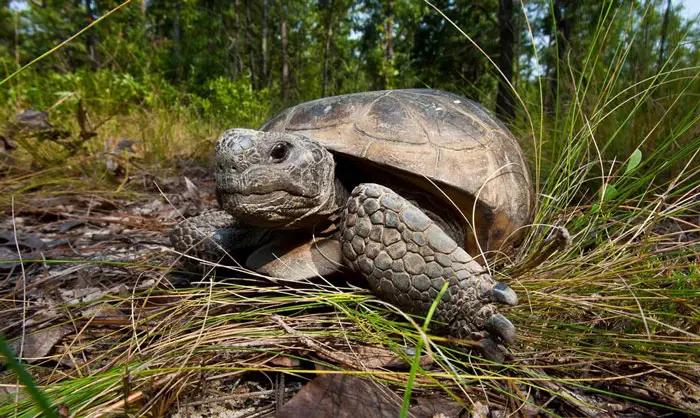
Although tortoises can go for extended periods without eating, their drinking needs differ. If a tortoise can drink clean water and soak without being harmed, they will survive for much longer, even if they are not eating.
The worst that can happen to tortoises that don’t have food but have plenty of water is that they will gain weight, which happens all the time in the wild.
How Long Can A Tortoise Go Without Water?
If you don’t give your Tortoise any food for six months, it can survive that; however, when it comes to water, things are different. Despite the fact that tortoises are not swimming aficionados, water is their ground reality.
In a nutshell, a tortoise can live as much as one week without water in arid regions. However, if they live in humid regions like burrows or have access to rainwater, they might absorb moisture from surrounding areas and live a bit more.
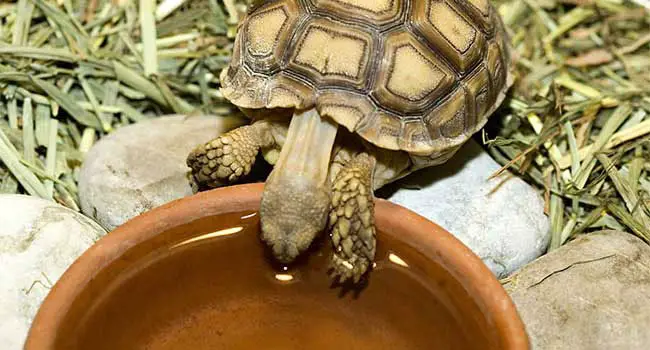
Note that tortoises also absorb moisture from the food they eat. So if you feed them veggies and greens only (not water), they can also store the water. About that a study showed that desert tortoises could go as much as one year only if they have access to greens and weeds.
It is essential to provide water access to tortoises for their well-being since excessive dehydration can be a health risk for them. In the long run, dehydration causes kidney damage.
Is it Necessary to Feed Tortoise Every day?
The answer depends on your tortoise’s age. You should feed them daily if you have a little tort, say less than six months old. As we mentioned earlier, baby tortoises are hyperactive, and their metabolism works fast, so they must be fed daily.
Moreover, the first year of the tortoise is important for their development, so you must take good care of their diet.
However, for adult tortoises, you don’t need to worry about feeding daily. You can feed them after two days safely as it does not risk their health. But in case of any trouble with your tortoise, you must seek professional help.
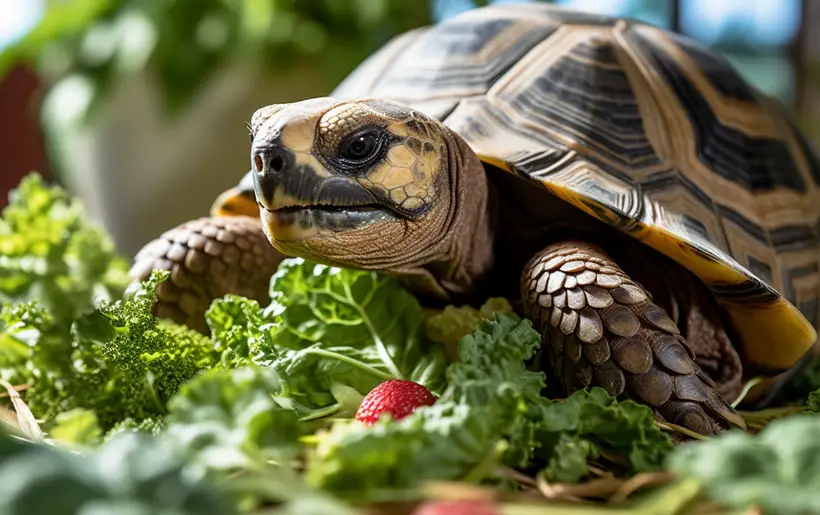
FAQs
Below we are mentioning some of the most common concerns of tortoise parents.
From our above discussion, you will have the idea that every tortoise is unique, as are their dietary needs. In general, adult tortoises can go without food for six months. But the general recommendations are to feed an adult turtle after every one or two days.
However, you should provide a balanced diet for young ones every day since their metabolism works fast. But remember, it is better to consult a reptile vet so that they can better guide you in your tortoise’s unique needs.
While you can leave your grown-up tortoise alone for a week, it is not good practice. Why? Because chances are that the tortoise might flip itself. And since you will not be there to turn them, which can even be fatal in some cases.
So as far as diet is concerned, you can leave them without any food but for safety, it is not a good practice.
Adult tortoises can survive a week or longer if you don’t give them water, but for babies, it’s different. Not only do they need water for survival, but for their optimal physical appearance as well.
In fact, you should soak your baby tortoise in warm water for 10 minutes. And also, don’t forget that their bladders are underdeveloped, so they can’t store water in their body. It is better to provide the water daily.
Conclusion
Tortoises are pretty tough creatures when it comes to their fasting period. Under some conditions, they can survive as much as three years without food since they can store fat in the body to utilize when needed. They can survive harsh conditions easily.
Moreover, they can also hibernate when the temperature decreases, so they know how to survive without food. Moreover, the tortoise will only survive a week if you don’t provide them with water. So it is essential to take care of the tortoise’s diet.

